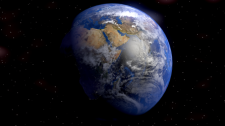Accessible Synthetic Biology Raises New Concerns for DIY Biological Warfare
By Joseph Neighbor,
VICE Motherboard
| 08. 23. 2016
This December, the signatory nations of the Biological Weapons Convention (BWC) will meet, as they do every five years, to discuss the state of bioweapons globally. In at least one way, the world has radically changed since they last met, in 2011. The discovery of several novel gene-editing techniques, most famous being CRISPR-Cas9, might be the scientific breakthrough of this century. It has unleashed a torrent of studies that aim to cure everything from cancer to world hunger.
But this new era of synthetic biology has a dark side. Scientific discoveries generally outpace our ability to legislate sensible limits, or even understand exactly what we’re playing with; that’s the point of experimental research, after all: to chart the unknown. The discovery last year that scientists in China have begun using gene-editing techniques on human embryos—a troubling, unprecedented step towards a sci-fi dystopia —has ignited a vigorous global debate about the limits we ought to have when manipulating biology.
The advent of CRISPR has corresponded with a widespread democratization of biology. Gene-editing kits are cheap, legal, and relatively easy to...
Related Articles
A Review of Exposed by Becky McClain
“Do not get lost in a sea of despair. Be hopeful, be optimistic. Our struggle is not the struggle of a day, a week, a month, or a year, it is the struggle of a lifetime. Never, ever be afraid to make some noise and get in good trouble, necessary trouble.”
— John Lewis
Becky McClain became famous when she successfully sued Pfizer, one of the very largest pharmaceutical and biotech companies. She...
By Katherine Long, Ben Foldy, and Lingling Wei, The Wall Street Journal | 12.13.2025
Inside a closed Los Angeles courtroom, something wasn’t right.
Clerks working for family court Judge Amy Pellman were reviewing routine surrogacy petitions when they spotted an unusual pattern: the same name, again and again.
A Chinese billionaire was seeking parental...
By Sarah Kliff, The New York Times | 12.10.2025
Micah Nerio had known since his early 30s that he wanted to be a father, even if he did not have a partner. He spent a decade saving up to pursue surrogacy, an expensive process where he would create embryos...
By Carter Sherman, The Guardian | 12.08.2025
A huge defense policy bill, revealed by US lawmakers on Sunday, does not include a provision that would have provided broad healthcare coverage for in vitro fertilization (IVF) for active-duty members of the military, despite Donald Trump’s pledge...




